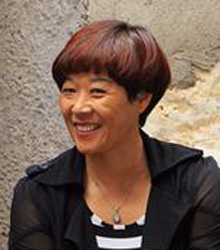| PEOPLE
Chu Takes Charge
 |
|
(FILE) |
Eric Chu, Mayor of New Taipei City in northern Taiwan, took office as chairman of the island's ruling Kuomintang (KMT) on January 19 after winning a landslide victory in the party leadership election. In recent years, the KMT has promoted relations between Taiwan and the mainland in keeping with the principles of "peaceful development, mutual benefit and win-win results," he said in his inaugural speech, adding that cross-Straits relations should continue to develop in this direction.
When the People's Republic of China was founded in 1949, the KMT, whose regime was toppled in a civil war, retreated to Taiwan. Ma Ying-jeou, the incumbent leader of the region, stepped down as KMT chairman in December last year to take responsibility for the party's defeat in local government elections.
Born in 1961 in Taoyuan, Chu holds a Ph.D. in accounting from New York University. He previously served as Taiwan regional legislator and chief of Taoyuan County.
Samaritan Repaid
 |
|
(FILE) |
Dai Xingfen, a middle-aged woman who runs a restaurant in Taizhou, east China's Zhejiang Province, recently came under the national media spotlight because of her heartwarming deeds more than 20 years ago.
In 1993, 17-year-old He Rongfeng and two friends went to Taizhou for work, but ended up roaming on the street after failing to find a job. They were forced to beg for food. Dai took He and his friends home, helped the boys look for employment, and gave them pocket money.
But the best thing she gave them was a piece of good advice. "She said that one should always strive to be a good person," He recalled. In 2013, He, who had become a successful businessman in Shenyang, northeast China's Liaoning Province, found Dai. He repaid his benefactor's kindness by offering her a whopping 1 million yuan ($160,000). Dai refused his offer of riches. Instead, He gifted Dai a work of calligraphy that reads, "Gratitude as heavy as a mountain."
QUOTE
"Appointing Tibetans to major posts is an important way to achieve sustainable development, as they constitute the majority of the population in Tibet."
Painba Lhamo, an assistant research fellow with the Tibet Academy of Social Sciences, during an interview with Xinhua News Agency on reports that ethnic minorities hold more than 70 percent of the seats in the regional legislature
"Doubt and dispute emerged after the initiatives came out, but time and success will prove that mutual understanding and hand-in-hand development are the core values of such plans."
Sha Zukang, Secretary General of the UN Conference on Sustainable Development, commenting on China's Silk Road Economic Belt and 21st-Century Maritime Silk Road Initiatives
"Judging from the current speed, China will soon become a net outbound investor."
Zhong Shan, Vice Commerce Minister, revealing that China's outbound investment reached $102.9 billion in 2014, an increase of 14.1 percent from a year earlier, on January 16
"Civil servants' low salaries may be a cause of corruption, but raising their salaries does not necessarily mean corruption will disappear."
Hu Xingdou, a professor with the Beijing Institute of Technology, speaking about the government's decision to give civil servants a raise in a recent interview with Global Times
MEDIA DIGEST
New Trends in Outbound Investment
Oriental Outlook
January 15
As China's overseas investment continues to increase, it has been predicted that the results of significant change in focus from "commodity exports" to "capital exports" will reshape China's economic development pattern.
Oriental Outlook conducted a survey about the future trends of China's outbound investment among large Chinese enterprises with overseas business and foreign diplomats in China, and drew the following findings:
For foreign officials, China's most promising overseas investment fields are energy, infrastructure facilities and agriculture. With respect to attracting Chinese investors, the advantages they most frequently claimed their respective countries possess were investment policies, regional economic integration or free trade agreements, tax policies and financial subsidies. According to them, the greatest challenges posed to Chinese investors relate to cultural differences, business models and managerial expertise. For Chinese entrepreneurs, the opportunities most cited were in energy, infrastructure facilities and the manufacturing sector. According to them, the biggest challenge facing their overseas development was personnel.
The predicted trends for China's overseas investment in 2015 included: fast investment growth, a rapid increase in investment in developed countries, the impact of the twin engines of the Silk Road Economic Belt and 21st-Century Maritime Silk Road Initiatives becoming increasingly tangible, enhanced competitiveness of Chinese companies in the international market, and more focus being placed on sustainable development and social responsibility.
Manufacturing Industry at a Crossroads
Economy & Nation Weekly
January 12
The manufacturing industry has been the engine of global economic growth since the Industrial Revolution in the 18th and 19th centuries. In any given country, growth in this sector has been a major determinant of economic competitiveness. Notably, China has realized tremendous growth since it launched its reform and opening-up program in the late 1970s by attracting foreign investment and promoting the development of its manufacturing industry.
Today, however, China's manufacturing industry faces unprecedented challenges with pressing problems such as the slowdown of economic growth, a fading demographic dividend, rising production costs and excess production capacity. The manufacturing industry's profitability and the contribution it makes to China's economy have continued to slide. In this context, the crucial and most challenging task of China is facilitating and nurturing innovation in its manufacturing industry.
China's manufacturing sector has now come to a new crossroads. The country must carry out a strategy of making itself stronger through a powerful manufacturing industry while attempting to uncover the logic of sound economic growth. It is faced with urgent tasks such as further focusing on the momentum engendered by innovation, creating new advantages for its manufacturing industry and boosting the development of emerging industries against the backdrop of China's "new normal," a term that refers to the country's current economic state. Relying on innovation to upgrade China's traditional economic structure constitutes the most feasible path.
Tougher Punishment for Child Purchasing
Guangzhou Daily
January 15
Recently, police in north China's Shandong Province captured a gang of baby traffickers. They transported mothers-to-be to secret locations where the mothers would give birth to babies, who were then sold at prices ranging from 50,000 yuan ($8,052) to 80,000 yuan ($12,882) each.
Child trafficking is a crime. Despite the efforts of the authorities in cracking down on child trafficking, the fact remains that it is difficult to curb this type of crime. One important reason for this is that current laws exempt the buyers of trafficked children from punishment provided they do not abuse the children and are cooperative with the police in the rescuing process, with a view to encouraging buyers to cooperate with the authorities.
When it comes to the trafficking of children and all associated transactions, more severe penalties should be imposed on buyers, so as to deter others from engaging in the practice. China's top legislature, the National People's Congress, has already decided to make the buying of trafficked children a crime in the new draft of amendments to China's Criminal Law.
The whole of society must be made aware that both selling and buying children are equally immoral. Meanwhile, the thresholds for adoption of babies need to be properly lowered, so that more families will be able to foster children through legitimate channels. | 